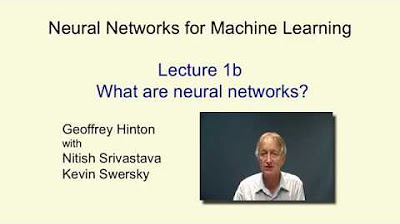What is so special about the human brain? | Suzana Herculano-Houzel
Summary
TLDRThis script explores the unique features of the human brain, particularly its large number of neurons in the cerebral cortex, and how this contributes to our advanced cognitive abilities. By comparing human brains to those of other animals, especially primates, the speaker highlights how our brain is larger and more energy-consuming than expected. The discovery that humans have the most neurons in the cerebral cortex is key. The speaker emphasizes that cooking, which emerged 1.5 million years ago, enabled early humans to afford the energy needed for such a brain, marking a critical turning point in human evolution.
Takeaways
- 😀 The human brain is not as large as it seems compared to other animals, but it has a unique number of neurons, especially in the cerebral cortex.
- 😀 Scientists once believed all mammalian brains were structurally the same, but this assumption has been proven wrong by modern research.
- 😀 The human brain uses a disproportionate amount of energy—about 25% of the body’s total energy, despite being only 2% of body weight.
- 😀 Human brains are larger than they should be compared to other great apes, which led scientists to claim our brain is 'special.' However, this is not an accurate comparison.
- 😀 The human brain has around 86 billion neurons, with 16 billion of them in the cerebral cortex, the seat of complex cognitive functions like reasoning.
- 😀 Different species have differently structured brains—larger animals like elephants and whales have bigger brains, but they don't have more neurons than humans.
- 😀 The size of an animal's brain does not directly correlate with its cognitive abilities. For instance, a cow’s brain is larger than a chimpanzee’s but much less capable.
- 😀 Humans, as primates, are more similar to other primates than to rodents in terms of brain structure, making comparisons to rodents an unfair measure of our cognitive abilities.
- 😀 The large number of neurons in the human brain can be explained by evolution, which allowed humans to have larger brains without needing an excessively large body.
- 😀 Cooking food allowed early humans to extract more energy from their food, which freed up time and energy for cognitive growth, facilitating the evolution of the human brain and our cognitive abilities.
Q & A
What was the common belief about the structure of mammalian brains before recent studies?
-Before recent studies, scientists believed that all mammalian brains, including the human brain, were made in the same way, with a number of neurons proportional to the size of the brain.
How does the size of a brain relate to its number of neurons in mammals?
-In mammals, it was traditionally thought that larger brains would always have more neurons, and thus the larger the brain, the more cognitively capable its owner should be.
Why was the human brain considered an anomaly compared to other mammals like elephants and whales?
-The human brain was considered special because, despite being much smaller than those of elephants or whales, it was believed to be more functionally efficient due to its larger cerebral cortex, which is responsible for complex cognitive functions.
What did the speaker discover about the neuron count in the human brain?
-The speaker discovered that the human brain has approximately 86 billion neurons, 16 billion of which are in the cerebral cortex, which is the most of any species and is crucial for cognitive abilities.
How does the human brain compare to the brains of other primates in terms of neuron density?
-Unlike rodents, whose brain size increases rapidly without a proportional increase in neurons, primates gain neurons without the average neuron size becoming larger, making primate brains more neuron-dense for their size.
Why are the brains of gorillas and orangutans smaller than the human brain, despite their larger body size?
-Gorillas and orangutans can afford fewer neurons because there is a trade-off between body size and neuron count. Larger bodies require more energy, leaving less available for the brain, which is why they have fewer neurons than humans.
What role does energy consumption play in the evolution of the human brain?
-The human brain uses about 25% of the body's total energy despite accounting for only 2% of body weight. This high energy requirement has historically been seen as a paradox, which was resolved with the discovery of cooking.
What discovery helped explain how early humans could afford such a large brain?
-The discovery that cooking food allowed early humans to extract more energy from food in less time helped explain how they could support a large brain without spending excessive time eating and foraging.
What cognitive functions are primarily associated with the human cerebral cortex?
-The human cerebral cortex is primarily associated with higher cognitive functions such as awareness, abstract reasoning, and logical thinking.
How did cooking influence human evolution, according to the speaker?
-Cooking allowed humans to pre-digest food outside their bodies, making it more energy-efficient to digest. This saved time and energy, allowing early humans to invest more energy into brain development and cognitive activities, ultimately leading to the advancement of civilization.
Outlines

此内容仅限付费用户访问。 请升级后访问。
立即升级Mindmap

此内容仅限付费用户访问。 请升级后访问。
立即升级Keywords

此内容仅限付费用户访问。 请升级后访问。
立即升级Highlights

此内容仅限付费用户访问。 请升级后访问。
立即升级Transcripts

此内容仅限付费用户访问。 请升级后访问。
立即升级浏览更多相关视频

The amazing brains and morphing skin of octopuses and other cephalopods | Roger Hanlon

How the human brain works

The Evolution of the Brain

Lecture 1.2 — What are neural networks — [ Deep Learning | Geoffrey Hinton | UofT ]

Kegel Routine for Better Erections (Men Over 45-listen up!)

The Evolution of the Cerebral Cortex: How Primates Changed the Brain Game
5.0 / 5 (0 votes)
